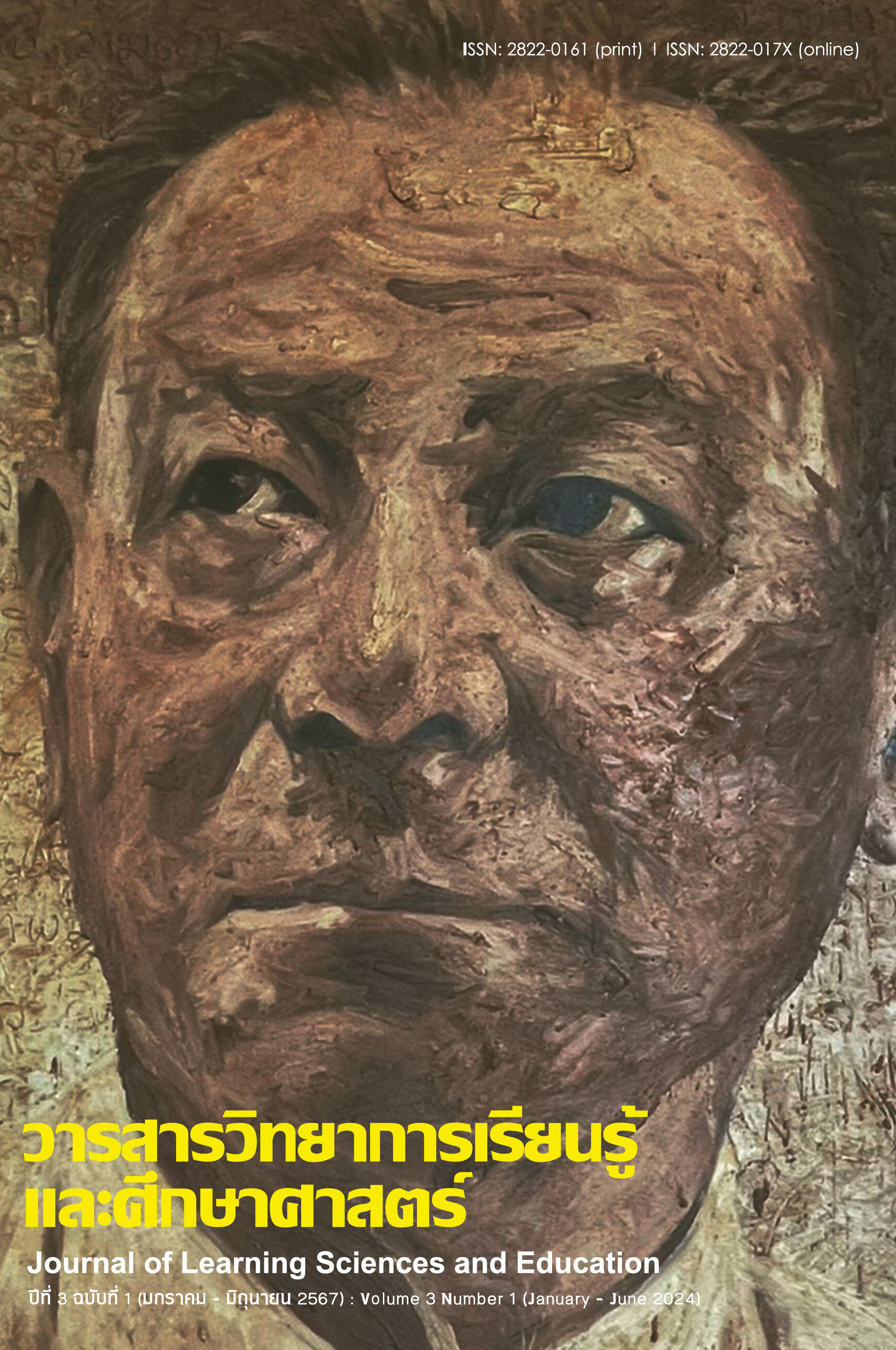การพัฒนากิจกรรมการเรียนรู้ตามแนวคิดกระบวนการคิดเชิงออกแบบร่วมกับชุดตัวต่อเลโกเพื่อการศึกษา (LEGO Education) เพื่อส่งเสริมความสามารถด้านการคิดเชิงนวัตกรรมของนักเรียนชั้นประถมศึกษาปีที่ 2
Main Article Content
บทคัดย่อ
การวิจัยนี้มีวัตถุประสงค์ 1) เพื่อพัฒนากิจกรรมการเรียนรู้ตามแนวคิดกระบวนการคิดเชิงออกแบบร่วมกับชุดตัวต่อเลโกเพื่อการศึกษา และ 2) เพื่อประเมินความสามารถด้านการคิดเชิงนวัตกรรมของนักเรียนชั้นประถมศึกษาปีที่ 2 หลังการจัดการเรียนรู้โดยใช้กิจกรรมการเรียนรู้ตามแนวคิดกระบวนการคิดเชิงออกแบบร่วมกับชุดตัวต่อเลโกเพื่อการศึกษา กลุ่มตัวอย่างที่ใช้ในการวิจัย คือ นักเรียนชั้นประถมศึกษาปีที่ 2 จำนวน 40 คน ซึ่งได้มาด้วยการเลือกแบบเจาะจง เครื่องมือที่ใช้ในการวิจัย ได้แก่ 1) แบบประเมินความสามารถด้านการคิดเชิงนวัตกรรม 2) แบบประเมินผลงาน และ 3) แบบสังเกตพฤติกรรมการปฏิบัติกิจกรรมกลุ่ม สถิติที่ใช้ในการวิเคราะห์ข้อมูล คือ ค่าร้อยละ ผลการวิจัย พบว่า 1) กิจกรรมการเรียนรู้ตามแนวคิดกระบวนการคิดเชิงออกแบบร่วมกับชุดตัวต่อเลโกเพื่อการศึกษา มุ่งเน้นให้นักเรียนพัฒนาความสามารถด้านการคิดเชิงนวัตกรรม ผ่านการคิดแบบเป็นระบบ และการปฏิบัติตามขั้นตอนการออกแบบวิธีแก้ไขปัญหา/นวัตกรรม 5 ขั้นตอน ได้แก่ 1) ขั้นการพิจารณาปัญหา (empathize) 2) ขั้นระบุปัญหาและกรอบของปัญหา (define) 3) ขั้นการระดมสมอง (brainstorm) 4) ขั้นสร้างต้นแบบ (prototype) และ 5) ขั้นทดสอบ (test) 2) ผลการประเมินความความสามารถด้านการคิดเชิงนวัตกรรมหลังการจัดการเรียนรู้โดยใช้กิจกรรมการเรียนรู้ตามแนวคิดกระบวนการคิดเชิงออกแบบร่วมกับชุดตัวต่อเลโกเพื่อการศึกษาอยู่ในระดับดีมาก คิดเป็นร้อยละ 30 ระดับดี คิดเป็นร้อยละ 65 และระดับปานกลาง คิดเป็นร้อยละ 5
Article Details

อนุญาตภายใต้เงื่อนไข Creative Commons Attribution-NonCommercial-NoDerivatives 4.0 International License.
เอกสารอ้างอิง
Altakhayneh, B. (2020). The Impact of Using the LEGO Education Program on Mathematics Achievement of Different Levels of Elementary Students. European Journal of Educational Research, 9(2), 603-610.
Ferreira, C., Robertson, J., Pitt, L., & Lord Ferguson, S. (2024). Unlocking Student Creativity with Lego® Serious Play: A Case Study from the Graduate Marketing Classroom. Marketing Education Review, 34(2), 153-163.
Graffin, M., Sheffield, R., & Koul, R. (2022). ‘More than Robots’: Reviewing the Impact of the FIRST® LEGO® League Challenge Robotics Competition on School Students’ STEM Attitudes, Learning, and Twenty-First Century Skill Development. Journal for STEM Education Research, 5(3), 322-343.
Jirasingularoj, C. (2016). การพัฒนากิจกรรมการเรียนรู้คณิตศาสตร์โดยใช้โมเดลการแปลงของเลชด้วยตัวต่อเลโก้ (LEGO®) เพื่อเสริมสร้างมโนทัศน์และความคงทนในการเรียนรู้เรื่อง เศษส่วนชั้นประถมศึกษาปีที่ 4 [Development of Mathematics Learning Activities by Using Lesh’s Translation Model with Lego® Brick to Enhance Maththematics Concepts and Retention on Fraction in Grade 4] (Master’s degree thesis, Naresuan University). Phitsanulok.
Kijkuakul, S. (2023). การจัดการเรียนรู้วิทยาศาสตร์ในศตวรรษที่ 21 [Learning Management in 21st Century]. Phitsanulok: Naresuan University Press.
Pimdee, P., Jedaman, P., Kidrakarn, P., Sukkamart, A., Wangsa-ard, K., & Suksup, C. (2017). การพัฒนาการศึกษาภายใตกรอบประเทศไทย 4.0 สู่ศตวรรษที่ 21 [The educational development in the 21st century under the Thailand 4.0 framework]. Journal of industrial education, 16(2), 199-206. Retrieved from https://ph01.tci-thaijo.org/index.php/JIE/article/view/132985/99761
Phornphisutthimas, S. (2013). การจัดการเรียนรู้วิทยาศาสตร์ในศตวรรษที่ 21 [Learning Management of Science in 21st Century]. Journal of Research Unit on Science, Technology and Environment for Learning, 4(1), 55-63. Retrieved from https://ejournals.swu.ac.th/index.php/JSTEL/article/view/4078/4048.
Prajan, O., & Chaemchoy, S. (2018). รูปแบบการบริหารเพื่อพัฒนาทักษะการคิดเชิงนวัตกรรมของครูในสถานศึกษาขั้นพื้นฐาน [Administrative model for development teacher’s innovative thinking skills in the Basic Education School]. FEU Academic Review, 12(1), 156-169. Retrieved from https://so01.tci-thaijo.org/index.php/FEU/article/view/89659/90099
Sotério, C., dos Santos Lamim, A. R., & Queiroz, S. L. (2023). Teaching controversial socio-scientific issues in online exhibits of science museums: Covid-19 on the scene. Disciplinary and Interdisciplinary Science Education Research, 5(1), 1.
Singto, A. (2018). การพัฒนาชุดการสอนวิชาคณิตศาสตร์โดยใช้ตัวต่อเลโก้เรื่อง เศษส่วนสำหรับนักเรียนชั้นประถมศึกษาปีที่ 5 [The delevelopment of mthemtics instructionl pckge by using lego on frctionl for prtomsuks 5 students] (Master’s thesis, Burapha University). Chonburi. https://buuir.buu.ac.th/xmlui/handle/1234567890/7651
Tamyim, N. (2022). การศึกษาโมเดลเชิงสาเหตุทักษะการคิดเชิงนวัตกรรมของอาจารย์โรงเรียนสาธิตสังกัดกระทรวงการอุดมศึกษา วิทยาศาสตร์ วิจัยและนวัตกรรมจังหวัดกรุงเทพมหานคร : การประยุกต์ใช้โมเดลมิมิคแบบกลุ่มพหุ [A study of causal model of innovative thinking skills of teacher in demonstration school of ministry of higher education, science, research and innovation in Bangkok: Applied mimic model with multigroup analysis] (Doctoral dissertation, Srinakharinwirot University). Bangkok. http://ir-ithesis.swu.ac.th/dspace/handle/123456789/1864
The American Presidency Project. (2016). Fact Sheet: Celebrating President Obama's Top 10 Actions to Advance Entrepreneurship, and Announcing New Steps to Build on These Successes. Retrieved from https://www.presidency.ucsb.edu/documents/fact-sheet-celebrating-president-obamas-top-10-actions-advance-entrepreneurship-and.
Tongaht, C. (2018). การจัดการเรียนรู้ภาษาไทยโดยใช้สมรรถนะในศตวรรษที่ 21 เป็นฐาน: ทฤษฎีสู่การปฏิบัติ [Thai Language Learning Management Using 21st Century Competencies-based]. Journal of Education Studies, 46(1), 171–184. Retrieved from https://so02.tci-thaijo.org/index.php/EDUCU/article/view/113659
Ouyang, F., & Xu, W. (2024). The effects of educational robotics in STEM education: A multilevel meta-analysis. International Journal of STEM Education, 11(1), 7. https://doi.org/10.1186/s40594-024-00469-4


